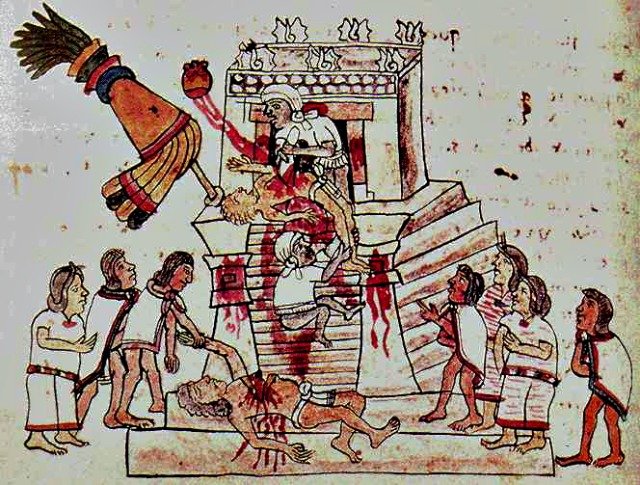Death Cult Thought Experiment

This is a new take on an old philosophical debate. I'd like to know what y'all think.
Let's say a person (now an adult) was raised in, and has lived up until now, in a death cult.
In the death cult, it was considered normal and even righteous to kill people and sacrifice them to the gods. Even the sacrifice victims were indoctrinated to believe that being sacrificed was a great religious honor.
The death cult member in question has either never encountered the idea that killing and human sacrifice are wrong, or, if he has, the cult countered it with such heavy brainwashing and indoctrination that the idea never had the chance to germinate.
Now this person has been physically separated from his death cult fellows and has entered our regular society. (I don't know how he got separated. Maybe he was the sole survivor of a rival death cult attack. Or maybe he time traveled here from the Aztec Empire. Maybe he simply wandered off and got lost.)
Anyway, upon entering our society, the death cult member kills and ritually sacrifices someone.
Questions:
- Has the death cult member committed murder? (I think most of us would say yes, but if you don't think so, please explain your reasoning in the comments.)
- To what extent does the death cult member bear the guilt or responsibility for the crime he has committed?
- Is his level of moral guilt the same as or different from his legal responsibility?

Hi, I'm Starr!
I believe all human interactions should be consensual

Interesting question.
The quote, "The law of the land is the law," comes to mind, but how it got to be in my mind is a mystery. A quick google search reveals it's part of the Jewish tradition. But I think it's the most practical approach.
A human sacrifice performed in a land where such an act would be murder, it must be prosecuted as murder. Likewise, a missionary going to a land where it was performed as religious ritual would be criminal in preventing the performance of a sacred rite.
Also, an individual death-cult member coming to a modern country would not, by himself, be likely to bear the authority to perform a ritual murder, even by his own standards. Presumably such an act would require priests, a congregation to vest those priests with authority, and an entire infrastructure and culture in place locally to give the act its sacred meaning.
However, the possibility of this sort of thing becomes much more alarming when a significant population re-locates, and it's probably the fear of just this sort of ritual and practice that makes anti-immigration folks nervous when they see their culture being disrupted by migrants moving, en-masse, into their territory. (Rightly or wrongly?)
For a contemporary (rather than a theoretical) example, consider the Muslim families that have murdered their daughters in the UK for bringing shame to them through promiscuity or adultery. In their own lands, this would be a reasonable, honorable act.
Setting aside legal culpability, do you think the foreign sacrificer has any moral responsibility for what he has done? If a person is totally ignorant of a moral precept, is he morally guilty for breaking it?
I'd say if he is in or around "society," he must pay the price for such actions. Just like if a puma or a bear gets loose and kills someone. Threats must be removed ...
When I think about problems in social objectivity this a good example. There isn't a clear answer. To the death cult person, the death is a social norm. To the non-death group, the death looks like murder.
Perfect justice would look like justice to all involved, but there is no possibility of that because the dead person would need to be brought back and made whole.
The killer was operating within the framework of social norms, so the individual construct of justice would be that the kill was just.
And this is the bigger problem with social objectivity, is that nobody owns it.
This example also shows why individuals should be prepared to defend their own life because you never know who is operating with which social norm, or when there is going to be disparities in social objectivity.
That's my two cents on it, cool post.
the question is reduced to the accepted norm in a particular society. for a humanistic society, the death of a person cannot be justified by any norms, except euthanasia. for some communities, the victims are normal, so it's a matter of worldview, because if the religion of hypothetical Aztecs prescribes human sacrifice in exchange for bliss, then for them it's normal and justified.